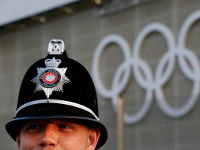London loses money on the Olympics
The Olympics in London turned into a loss for many segments of the urban business. The Games attracted not as many fans as expected and scared away thousands of "non-sporting" tourists on whose money the Londoners counted. Hoteliers, retailers, as well as numerous museums and other cultural institutions have suffered losses.

According to The Financial Times, over 100,000 foreign visitors came to see the Olympics to London. This is more than in the past games. But fans do not focus on shopping in London and spend far less money than conventional tourists. Market analysts say that 90 percent of London's Olympic tourists do not plan major purchases in the British capital.
Incidentally, the arenas in the stands do not appear to be sold-out. At this time 200,000 tickets for soccer and 100-120 thousand tickets for other events are still available.
Tickets are available for sale on the site of LOCOG, however, there is no rush to buy them. There is a new practice of selling tickets by those leaving the competition to those who would like to get in. Tickets go for ridiculous sums: 300 people watched Saturday's handball competition for only five pounds for an adult ticket and one pound for the children's one.
During this period, the non-Olympic London is usually visited by approximately 300,000 tourists. They leave their money in numerous shops, theaters, hotels and museums. Now their number has decreased dramatically precisely because of the anticipated discomfort in London in connection with the Olympics.
"In August London is usually visited by 300,000 foreign and 800,000 British tourists. These people have indicated that they stayed away. They were replaced by 500,000 people who purchased tickets to the Olympics. Many of them are London residents and tourists who came here to watch sporting events. They are not that interested in the sights. They did not come here to shop, eat, or admire the beauty," said a representative of the European Association of Tour Operators Tom Jenkins.
Theaters complain of falling incomes, and the past week was the worst of the year at the box offices. As head of the group of Nimax Theatres Nick Burns predicted, this summer ticket sales in the theaters located in the West End will be reduced by 30 percent.
The museum tickets sales fell by a third as well.
"Usually, tourists walk through the city center, but today's visitors come to watch the competition. People were scared away by the talk about the problems with transport. Although it seems to me that it works fine, and they should not be afraid," said the president of the Society of London Theatre Mark Rubinstayn.
British capital hotels also complain about loss of business. Before the 2012 Olympics in London hoteliers have increased prices for tourist accommodations. In June, the cost of overnight stays was increased by ten percent, to 226 euros. At the time of the Olympic tournament hotel services rose in price on average by 36 percent - up to 350 euros per night.
Clearly, hotels were ahead of themselves with the acceleration of prices in London. It turned out that for the period of the Games there were plenty of vacant rooms in hotels. Seeing the prospects of failure, the British hotel and tourist business began stepping back. They even reduced the price of the Olympics by about a quarter. The hotel reservation service "Jack Travel" stated that the hotel owners overestimated the expected flow of tourists to the Olympics.
Until recently, the owners of four-star hotels asked 300-400 pounds per day for a room. Reality has put everything into place and restrained the appetites of the hoteliers. Now one can stay overnight for 109-150 pounds. A two stars hotel is now taking an average of 50 pounds per person per night, against 200 pounds in anticipation of the Olympics.
Managing Director of Travel Agency Golden Tours Nick Palau complained to The Financial Times that the Olympics undermined the hotel business. "Earlier hotels inflated prices, and the largest tour operators actually stopped the sales in May. Our profit for this period decreased by 20 percent," said Palau.
In general, according to experts' calculations, hotel and excursion business have lost 20 and 35 percent of the projected gains, respectively. Only the owners of the establishments in the area of the Olympic Park have met the expected indicators.
Large retail chains that have the facilities in central London also noticed a reduction in the number of customers. It was projected that the number of buyers in the West-end stores this summer was supposed to reach 25 million. The reduction of the flow of customers was especially noticeable before the opening of the Olympics, when the West-end shops were visited by ten percent fewer people than usual at this time of year.
Anatoly Miranovsky
Subscribe to Pravda.Ru Telegram channel, Facebook, RSS!


